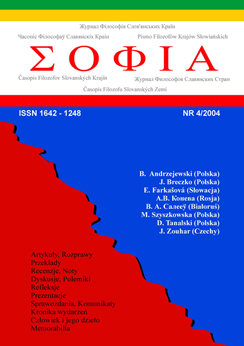We kindly inform you that, as long as the subject affiliation of our 300.000+ articles is in progress, you might get unsufficient or no results on your third level or second level search. In this case, please broaden your search criteria.

Book Review: Andrzej L. Zachariasz (red.), Narody słowiańskie wobec globalizacji, Wydawnictwo UR, Rzeszów 2003, ss. 310
More...
From the translator: In introduction to his considerations on ideas, pure quaJities and an essence, Hering emphasised that in spite of many diffrent problems, which had been analysed in phenonemology and the variety of solutions, one thesis was beyond a doubt - the existence of ideal objects. In the commentary to that thesis Ingarden wrote, that the analysis of essential questions: What ist it and sentences like: every square is a parallegram has got not only a formal aspect, but: "It is necessary to realize the content of the last sentence and explain the meaning of a word "square". To do this, we have to review the conceptions of ideas, pure qualities and an essence, which appeared throught-out contemporary history of philosophy - Husserl's conception and the most important Hering's one, which was presented in his work Bemerkungen über das Wesen, die Wesenheit und die Idee. Ingarden didin't agree with many solutions proposed by Hering, but the influence this work on him is unquestionable. The intention of tranlation this work was not only the presentation of this influence, although this historical aspect was important as well or the rendition of intelectual atmosphere those days. Hering's way of thinking and intrasigent eagerness for explaining the world of ideal objects show that this world still is and remains the real philosophical problem.
More...
Book Review: Bogusław Paź, Epistemologiczne założenia ontologii Christiana Wolffa, Wydawnictwo UWr, Wrocław 2002, ss. 311
More...
Book Review: Lech Zdybel, Idea spisku i teorie spiskowe w świetle analiz krytycznych i badań historycznych, Wydawnictwo UMCS, Lublin 2002, ss. 602
More...
The Round Table of The Philosophers of Slav Countries (30 V 2003)
More...
The Round Table of The Philosophers of Slav Countries (30 V 2003)
More...

The paper discusses political preconditions and consequences of the first Russian-Chechen war (December 1994-August 1996). Certain traits common both to Boris Yeltsin's and Dzhokhar Dudaev's regimes have been exposed. The mechanism of the manifestation of the peculiarities of the disintegration of empires in the post-Soviet space has been analyzed. It has been shown that the Russian center establishes the hierarchy for the solution of political problems that embroils the possibility of war. Institutional types of terrorism have been described as well as the influence of the executive and legislative power and the military-repressive structures on this process.
More...
The Round Table of The Philosophers of Slav Countries (30 V 2003)
More...
Book Review: Mikołaj Bierdiajew, Sens historii. Filozofia losu człowieka, tłum. Henryk Paprocki, Wydawnictwo ANTYK, Kęty 2002, ss. 152
More...
lndividuality-an evident characteristic of each and every one of life's phenomenons, Man or thing, cultural works or scientific discoveries. And, like most obvious concepts in classical rationality it didn't require any theories or analysis, on the contrary, theoretical thought always veered away from the individual, instead addressing the general or common, aspiring to find, in essence, the characteristics of worl phenomena. Cultural philosophy essentially defines the uniqueness of world experiences, above all else, those of Man, because Man's identity is precisely where individuality is found in its most complete form. We find this concept under "anthropological concepts" in western philosophy, and of course, in Russian philosophy which focuses on anthropological problems. The particularity of Russian philosophical thought lies in the fact that not only does it investigate the identity of humanities Being, but it also delves into its signijicance and meaning or essence, the idea of "Man within culture".
More...
Information about „The Round Table of The Philosophers of Slav Countries” (30 V 2003)
More...



The history of mankind is divided into two periods. The first period is that of the culture of love and killing. The second period is the period of the culture of love. Since times immemorial human culture exerts proscriptions of killing and prescriptions of love. Ever since then, however, we have been killing incessantly, furnishing this killing with lofty substantiations. Here they are: killing in necessary self-defense, killing arising from the "nature" (physical and social) of man, killing in the name of justice, killing in the name of freedom, equality, brotherhood and democracy, terrorist killing, killing for punishment, killing in the name of virtue and for immortality, mission killing, killing for love (caritas, pietas and amor), killing in sacrifice, martyrdom killing. In the perspective of these substantiations, killing acquires the highest value, mutually implemented by both the one who is killing and the one who is being killed. We are constantly and continuously in the first period. The second period does not exist.
More...
Book Review: Stanisław Kowalczyk, Filozofia Boga, Wydawnictwo KUL, Lublin 2001 , ss. 352
More...